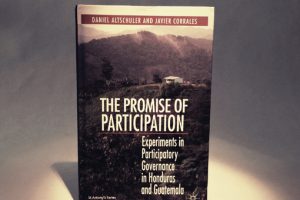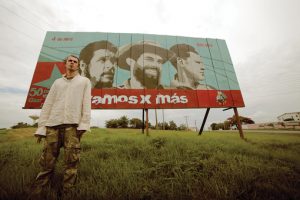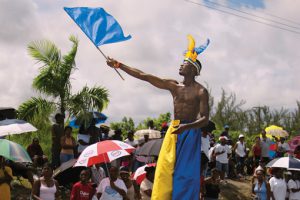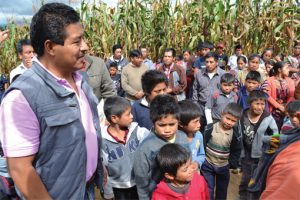
The Promise of Participation: Experiments in Participatory Governance in Honduras and Guatemala by Daniel Altschuler and Javier Corrales
Can democracy be built from the bottom up? Does community participation in small-scale initiatives increase civic and political engagement in the democratic process overall? In The Promise of Participation: Experiments in Participatory Governance in Honduras and Guatemala, Daniel Altschuler and Javier Corrales argue that efforts to engage local communities through community-managed schools (CMS) can increase … Read more

Dangerous Liaisons: Organized Crime and Political Finance in Latin America and Beyond by Kevin Casas-Zamora (editor)
What happens when a government is unwilling or unable to protect its citizens from organized crime? The proposition was tested recently in Michoacán, when “citizen self-defense forces” took up arms against the Knights Templar cartel in the absence of the state’s ability to protect them. Ultimately, federal troops and police joined the citizen militias to … Read more

Cuban Revelations: Behind the Scenes in Havana by Marc Frank
Popular interest in Cuba will continue to grow as Americans open their eyes and ears to one key fact: after 55 years, Cuba is changing. It is shifting from a highly centralized, paternalistic, socialist regime, both lauded and vilified for achieving social progress at the cost of democracy and civil liberties, to a hybrid system … Read more
Ask the Experts: Consulta Previa
Sonia Meza-Cuadra answers: Governments aim to make decisions that will improve the economic and social development and welfare of their citizens. But historically, decisions affecting Indigenous and tribal people’s culture, ancestral lands and habitats have too often been made without their participation. ilo 169 and the UN Declaration on the Rights of Indigenous Peoples seek … Read more
From the Think Tanks
Red de Seguridad y Defensa de América Latina (RESDAL), International Crisis Group, Universidad Nacional Autónoma de México Crossborder cooperation on crime, the institutional development of police and armed forces, and the role of private security are high on Central America’s public safety agenda. In “Public Security Index, Central America: Costa Rica, El Salvador, Guatemala, Honduras, … Read more

Ahora Sí Llego
Halfway between the Cuban towns of Martí and Baracoa, Cuban and Italian filmmakers José Balboa and Desiderio Sanzi plug a hole in the gas tank of their Russian Ural sidecar motorcycle with a glob of powdered deodorant and super glue. It’s a temporary fix for the machine that will carry them across all 15 Cuban … Read more

Produce on Wheels: Baltimore’s Pop-Up Mobile Farmers’ Market
Two to three days a week a bright green repurposed Washington Post truck roams the streets of northeast Baltimore. But instead of newspapers, it is delivering fresh fruit and vegetables. The produce is grown in the same neighborhood where it is consumed—on a six-acre “urban production farm” in Clifton Park. Through this mobile farmers’ market, … Read more

10 Things to Do: Manaus, Brazil
Manaus, the historic gateway to Brazil’s Amazon, melds a colorful past and a bustling entrepreneurial culture with its status as a symbol of biodiversity. Just beyond the riverport and the spectacular architecture of the city center is the rainforest that has lured adventurers and dreamers for centuries. Now, Manaus, home to nearly 1.8 million people, … Read more

Crop Over
The island of Barbados’ economy has evolved from its mono-crop dependency in the eighteenth century as the world’s largest sugar producer. But every summer, the island pays tribute to this legacy with a revival of a three-centuries-old harvest festival known as Crop Over. Originally, the festival was meant to cap the long sugar cane growing … Read more
World Cup Update
With preparations for the 2014 FIFA World Cup nearing completion, soccer fans across the region can turn their attention to what really matters: their national team’s chances of winning on the world’s biggest stage. Although European teams have won four of the last six competitions, South American teams have historically fared far better when playing … Read more
Policy Advocacy: U.S. Immigration Reform
Any meaningful comprehensive immigration reform in the United States must establish a pathway for the estimated 11 million undocumented immigrants to become eligible for legal residence and eventual citizenship. Getting unauthorized immigrants to some form of legal status, however, will require more than just legislative action; the nonprofit sector must mobilize and help them navigate … Read more
Currency: Argentina’s Devaluation
When Argentina devalued its peso by 19 percent against the U.S. dollar in January, Brazilian President Dilma Rousseff reaffirmed her country’s independence from the volatile currency of its southern neighbor. “It will not have significant consequences,” Folha de São Paulo reported her saying. Indeed, Brazil has large international reserves, a balanced budget and consistent growth … Read more
Travel Regulations: OFAC and Cuba
The re-opening of “people-to-people” travel to Cuba by President Barack Obama in early 2011 was the boldest and, arguably, the single most consequential step taken by his administration in relation to the island. It was in fact a revival of a Clinton-era exemption to the decades-old ban on U.S. citizens visiting that country. The exemption … Read more

Political Innovator: Mardoqueo Cancax
Growing up in the Indigenous municipality of Patzún, Guatemala, Mardoqueo Cancax experienced first-hand the frustration of living in a community without good roads and adequate infrastructure. But when he became a parent, he felt even more keenly how such challenges imperiled the future of Patzún’s children. He joined a parents’ committee working on municipal development … Read more

Business Innovator: Marco Perlman
Brazilian entrepreneur Marco Perlman profited twice from his country’s recent decade of sustained economic growth: first as a successful venture capital investor, and then as a risk-taker who turned a longtime hobby—photography—into a transformative eco-enterprise. A self-professed “technology freak,” Perlman, 40, founded the Brazilian digital photo products and services company Digipix in 2004. At the … Read more


